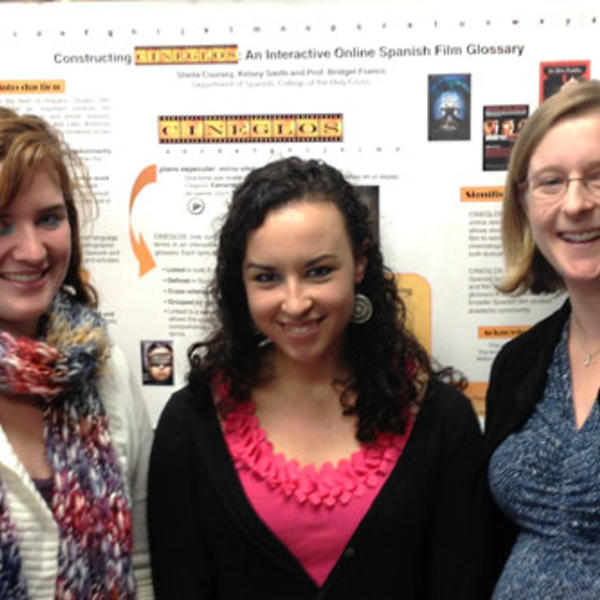Bridget Franco, assistant professor of Spanish at the College of the Holy Cross, was awarded the “2012 Best Media Prize” by the New England Council for Latin American Studies (NECLAS) for the development of CINEGLOS, a web-based Spanish-language audiovisual glossary of film techniques and cinematographic keywords accompanied by video clips from Latin American and Spanish films.
Sheila Coursey ’13 and Kelsey Smith ’13, who participated in the Andrew W. Mellon Summer Research program at the College in 2011 and worked with Franco on the award-winning project, were also recognized during the presentation at the NECLAS annual conference in November. The academic trio unveiled the interactive website, which has received international attention, and has been indexed in the MLA International Bibliography, the Society for Cinema and Media Studies, Latin American Network Information Center, and Yale University’s Film Studies Research Guide.
Reflecting on the motivation behind creating CINEGLOS, Franco remarks, “As the 21st century moves into another decade, Latin American and Spanish film courses are becoming increasingly popular. However, the pedagogical tools available lag far behind what our current technology is capable of producing.”
Therefore, in order to generate an accessible database of audiovisual representations of film terminology, she, Coursey, and Smith uploaded more than 150 film clips to the online glossary, balancing selections from a range of critically acclaimed Spanish and Latin American productions.
“Winning the ‘Best Media Prize’ at the NECLAS conference really affirmed the value of all the hard work we put into the site and the value it lends to Spanish and Latin American Studies classes at Holy Cross,” says Coursey, an English major with a concentration in Latin American and Latino Studies.
Smith, who is majoring in Spanish and philosophy and is a member of the prelaw program, explains that the College’s Summer Research Mellon Program allowed “cohesive research time that made not just for a productive summer, but also an enjoyable one.”
Because the program funds students’ research in the humanities, fine and performing arts, and social sciences for nine weeks, Smith says that she was able to “devote the entire summer to this work.”
“Throughout the summer, both students were extremely reliable, organized, and self-motivated team players,” says Franco. “Overall, their contribution to CINEGLOS was invaluable.”
Related Information
- Sheila Coursey '13 blogs about the research opportunity for the Holy Cross website last year
- CINEGLOS



